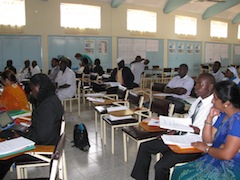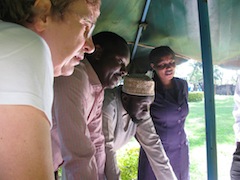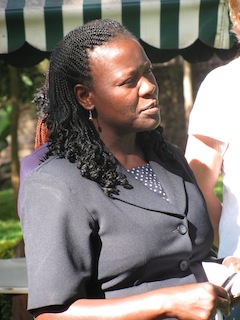Faith schools take sustainability agenda forward in Kenya
February 12, 2013:
 |
 |
 |
Participants taking part in the education workshop in Nairobi, Kenya |
An education workshop in Nairobi, Kenya, brought together school-teachers, educationalists and religious leaders as part of a programme to integrate faith values into teaching on the environment.
The two-day event, jointly organised by ARC and the Kenyan Organisation for Environmental Education (KOEE) in January, 2013, marked another step forward towards a significant faith contribution to Kenya’s national Education for Sustainable Development (ESD) programme.
ARC and KOEE are developing an ESD toolkit integrating faith values into teaching on the environment for primary schools in Kenya.
The event was attended by 25 primary school teachers, educationalists and representatives of Christian, Hindu and Muslim faith groups from all regions of the country.
Demonstration projects
Most of those attending had also taken part in a previous workshop organised by ARC and KOEE in March 2012 to look at integrating faith values in teaching on the environment using eco schools.
 |
 |
 |
Working together on a small group activity during the workshop |
Following that event 10 different demonstration projects were started in schools across the country, and the second workshop was excited and encouraged to hear reports of their activities. These ranged from improved hand-washing facilities and sanitation education for children to income generating sustainable agriculture projects involving growing fruit trees in school grounds.
“The workshop gave those teachers involved last March a chance to get together again and it was great to see how they’ve taken things forward,” commented ARC Education Officer Kirsty Main-Ellen, who took part in both events. “They really see how it fits with their educational tasks. They’ve been keeping in touch with each other by phone, like a support group, and their motivation really keeps it going as a network.”
While ESD is being provided across the country in educational, community and even business contexts, it is the specific engagement of faith groups that is new and significant, according to Kirsty. “In Kenya everyone is connected to their faith, whether Christian, Hindu or Moslem, and it is this faith element that excites the teachers. It’s a new way to look at things, drawing on their own values, and they share this between the religions. Working together on this project there has never been any disagreement on religious grounds.”
Teachers Toolkit
The biggest task facing the group is the development of a faith-based Teachers’ Toolkit for ESD. As well as giving guidance on lesson plans and environmental information, the toolkit will have an emphasis on activities that schools and pupils can undertake to improve the sustainability of their communities.
 |
 |
 |
Jacqueline Onyago from the Kenyan Institute of Education who took part in the workshop. |
This important piece of work is being managed by Dr Dorcas Otieno who is the Director of KOEE as well as a lecturer in Environmental Education at Kenyatta University. Work is under way and, following the second workshop, it is hoped that it will be published later this year, subject to recognition by the Kenyan Institute of Education.
“It is vital that the Institute approves the toolkit for head teachers to adopt it,” Kirsty explained. “That is why we were delighted that the workshop was attended by representatives of both the Institute and NEMA, the National Environmental Management Authority. Having taken part, they know what we’re doing and it’s what they want. They hadn’t linked ESD to faith values before, so it is a new area for them, too.”
As well as adding support to the development of a more sustainable environment, the toolkit will represent a powerful partnership between Kenya’s schools, educationalists and religious organisations – a model that it is hoped will apply across sub-Saharan Africa and beyond.
After the Kenyan toolkit is finalised, it will be made available to other countries in sub-Saharan Africa for them to adapt to meet their own needs.
|

